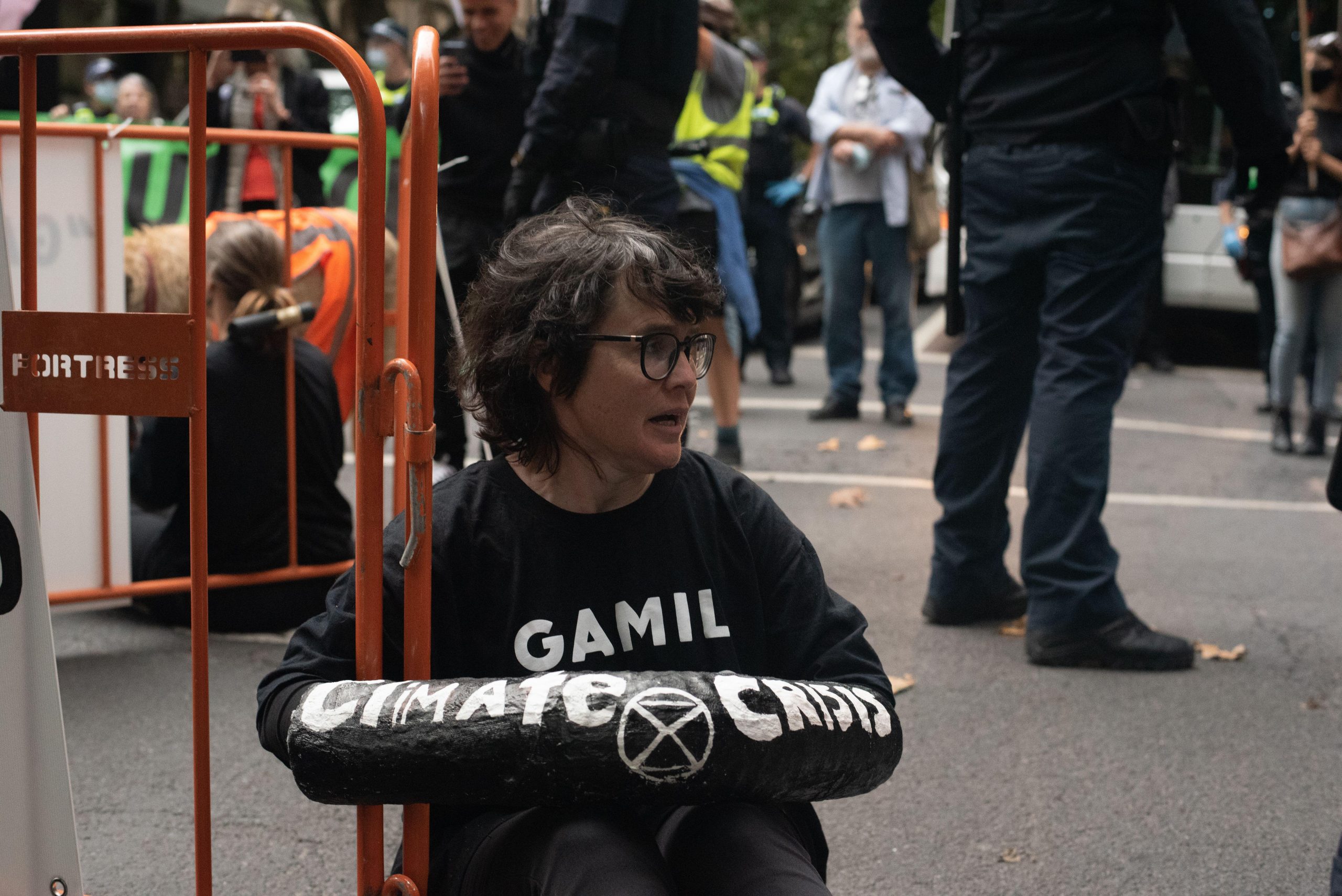Petrina Harley likens direct action to giving birth.
“My body knew it had a job to do, so I got on and focused on my inner strength,” the 53-year-old mother of two told Index via phone from Perth. “I find it really empowering.”
Harley is a climate activist of eight years facing trial in June for repeatedly blocking entry to Australia’s biggest gas hub to be built in a decade, a AU$16.5 billion ($10.35 billion) project in the Pilbara on the Burrup Peninsula of Western Australia (WA) by sector giant Woodside.
It may come as a surprise to some, but not to Harley, that new research from the University of Bristol released in December showed that Australia is now the world’s top country for arresting climate and environmental protesters.
“I’ve been arrested four times now,” said Harley. Alarmingly, arrest is now a common response in 20% of all climate and environmental protests in Australia, with the international average being 6.3%.
This is also part of a broader crackdown in the country, where new measures in the state of Victoria purportedly aimed at tackling recent cases of anti-Semitism could be used to target climate protesters, human rights lawyers have now warned.
There’s particular concern that a potential ban on “lock on” devices such as glue, chains or locks, could be used to take aim at environmental campaigners. Similar laws have been announced in New South Wales (NSW).
“The arrests [in Australia] are one dimension of criminalisation,” said Oscar Berglund, senior lecturer in International Public and Social Policy in the School for Policy Studies at the University of Bristol.
“There have also been multiple new anti-protest laws passed. What we are seeing currently is an intensifying criminalisation of protest in both democratic countries and less democratic countries.”
Harley, who began protesting after she had children, said that she had tried “everything under the sun” including running for the Senate in the lower house with the Socialist Alliance party, holding weekly stalls in town and gathering petitions, before she took part in two blockades in WA.
In the first one, in November 2021, Harley and another Scarborough Gas Action Alliance activist, Elizabeth Burrow, used a caravan to obstruct entry to the Woodside project. The activists bonded their arms into a concrete drum inside the vehicle. Harley was “locked on” for 16 hours. When she refused to move, she was arrested in the caravan and after being taken to hospital for injuries locked up overnight and charged. Harley said it was “complete overreach” by police.
The pair pleaded not guilty and used an emergency defence – normally reserved for cases like murder – arguing that the activities of Woodside are directly putting lives at risk. In 2023 they were found guilty by a magistrate’s court in Karratha in the Pilbara region of failing to obey an order given by an officer, obstructing public officers, and unreasonably obstructing or preventing the free passage on a path or carriageway.
They received a six-month community-based order, with a requirement to complete 100 hours of community service and were also handed a $600 fine each. Police initially sought more than $33,000 in compensation from the activists for removing them from the caravan, but this application was later dismissed.
Last July, Harley and another activist, Emma, a high school student, used a car and a boat to block the only access road to the same project, in a bid to stop its operations. Harley was “locked on” for 12 hours. She is now facing three obstruction charges over this.
At her trial in Perth in June, she will again plead not guilty using the extraordinary emergency defence.
“I’m very excited, I’ve got a really ethical lawyer who’s keen to test the case because it would be a precedent,” Harley said. “People have tried it before, but no one’s actually won. I’ve got some very high-profile witnesses to testify.”
David Mejia-Canales is a Sydney-based senior human rights lawyer at Australian group Human Rights Law Centre (HRLC). He said that an analysis of two decades’ worth of anti-protest legislation in Australia from 2003 onwards found that out of 49 pieces of legislation introduced, most target environmental protesters in the streets, at mines or logging sites. But laws are broad and vague despite peaceful protest being protected under international law.
“In Australia you just have to look out the window to notice that the climate crisis is getting worse and the thing that our governments are appearing to do is to jail climate protesters instead of actually doing anything that is meaningful and quick and long lasting about this,” said Mejia-Canales.
He said HRLC wasn’t aware of any activists in Australia who have been acquitted on an emergency defence. But framing the necessity defence (breaking the law to prevent greater harm) as an “extraordinary emergency defence” could allow protesters to use the growing acceptance of climate change as an emergency that requires urgent attention, he said.
However, just last week a climate activist in Melbourne was told that he cannot rely on evidence from climate experts following charges relating to an Extinction Rebellion protest.
Mejia-Canales said that Australia urgently needs a Human Rights Act, which could be crucial for climate activists, reinforcing arguments that their actions seek to uphold fundamental rights rather than merely disrupt public order.
A WA government spokesperson told Index: “Everyone is entitled to protest peacefully in WA, however police will respond to violent or threatening behaviour.”
Index approached the minister for climate change and energy for comment, but did not receive a reply.
Woodside said that it supported respectful debate. But it said acts intended to threaten, harm, intimidate or disrupt employees, their families or any other member of the community going about their daily lives “should be met with the full force of the law”.






